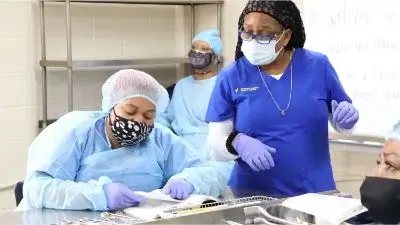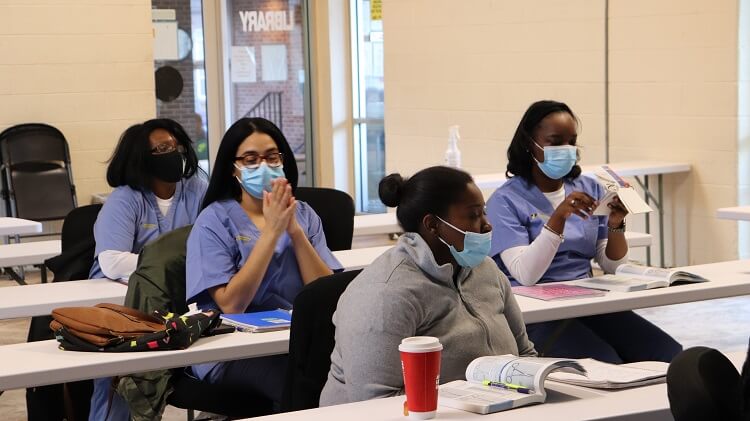The sterile processing tech training provides students with practical experience to work as entry-level sterile processing technicians. The primary duty of a sterile processing tech is to provide a clean and sterile healthcare environment. This is mainly achieved through the procedure of decontaminating and sterilizing all surgical equipment and instrumentation.
Sterile processing technicians are a specialist who disinfects equipment and tools in a surgical environment. They organize surgical units for scheduled and emergency surgeries. They utilize special sterilization equipment like autoclaves to decontaminate reusable surgical tools.
Sterile process technicians also look after a hospital’s hygiene resources. They even track the location of sterilization tools. Moreover, they’re accountable for handling their professional equipment and may schedule repairs as and when required.
Other titles of sterile processing technician include:
Sterile processing technicians access common pathogens in a medical environment. They apply sterilization techniques that they learn from sterile processing classes to ensure the surgical instrument is free from contaminants.
They often study microbiology and infection prevention to keep up-to-date skills related to the proper sterilization of medical tools. Furthermore, they may evaluate contamination risks in surgical environments.
It can furnish a surgical team they need to overcome obstacles and keep patients safe. Technicians are even responsible for transporting and storing sterilization and surgical equipment.

Students considering these technician training will learn various sterilization techniques. These include the proper method for decontaminating and sterilizing surgical tools and equipment. They will also achieve a solid knowledge of microbiology and infection control.
Other key areas covered in theoretical learning before training include human anatomy and surgical terminology. They further include sterile processing, surgical instrumentation, and safety & risk management. Students will also understand federal and state guidelines through sterile processing schools .
The training session includes a combination of lab hours and didactic, as well as a 450-hour clinical internship. The practical training provides the perfect environment to prepare students and permit them to practice their psychomotor skills. In addition, the practical experience acquired during the clinical internship will help reinforce those skills.
The sterile processing program is taught by utilizing a hybrid learning environment. All hybrid classes will use online and in-person instruction. Lectures may be presented on campus or remotely through a Learning Management System (LMS).
The practical training and Laboratory classes will be held on campus or at a clinical workplace.
Online classes are held synchronously. Synchronous instruction is real-time education that requires learners to attend classes at scheduled times.
The Sterile Processing program instructs students to complete a mandatory 450-hour clinical internship. Students are positioned towards a clinical site. A sterile processing technician on-the-job training is designed to deliver practical training in a real work environment.
Students will have a trainer who trains and directs them. Students cannot begin the internship until all required classroom and lab hours are met. The internship programs are based on the availability of clinical sites.
All trainees must be prepared to complete their internship during regular business hours. Most clinical sites do not permit students to finish clinical hours in the evening or on the weekend.
Sterile processing techs are engaged in the Central Supply, Sterile Processing, and Sterile Supply Departments of hospitals. Employment opportunities are also available in outpatient clinics, surgical centers, and physicians’ offices. Some employment options include central supply technician, sterile processing technician, and central service technician.
Sterile processing technicians generally develop soft skills and technical skills to execute their jobs effectively, including:
Sterile processing technicians perform with surgical teams and different medical personnel to prepare tools for procedures. They are liable to process and prepare equipment on time to confirm that surgeries run smoothly.
A Central processing technician keeps regular contact with medical teams to furnish status reports. They schedule repairs for equipment and equip surgical units for operations.

The technicians are accountable for preparing medical tools for safe surgical use. They depend on attention to detail to ensure they’ve finished each phase in the sterilization process.
sterile processing technicians organize an operating room for a scheduled procedure when an emergency emerges. In these situations, they generally evaluate risk factors and then make decisions about how to operate sterilization equipment and distribute resources.
The sterile processing technicians mostly work in clinics and hospitals. Most employers require them to seek essential life support and cardiopulmonary resuscitation training.
The life of a sterile processing tech is sure to be quite challenging. They have to run each day in the hospitals and clinics. Considering a career in this field is amazingly flourishing. You can opt for sterile processing technician training to resolve problems in a medical environment. By gaining practical exposure, you and your patients will remain safe.
Indeed, the employment rate for medical technicians has been firmly increasing.do not give a second thought to entering this field. Therefore, consider this trade today, and see your future bloom!
Read More:
Find a sterile processing trade program now!Discover Program

Search no more for sterile processing trade programs of your interest.
